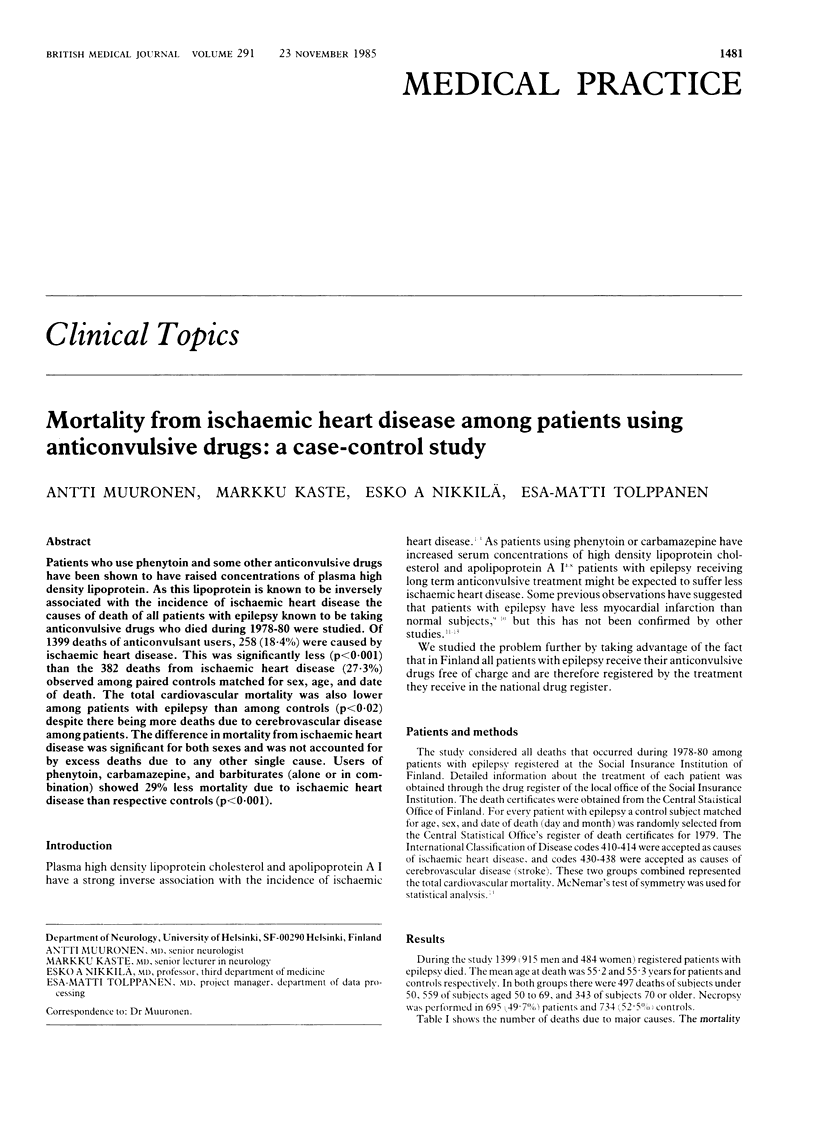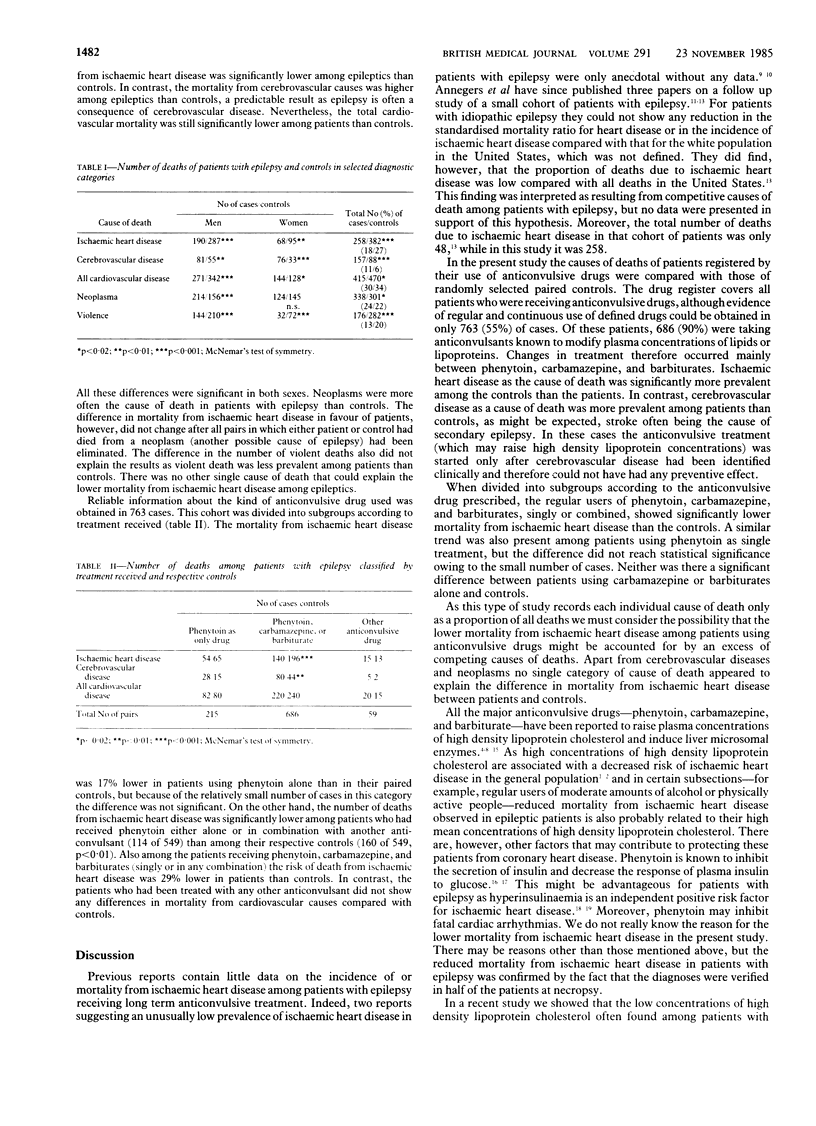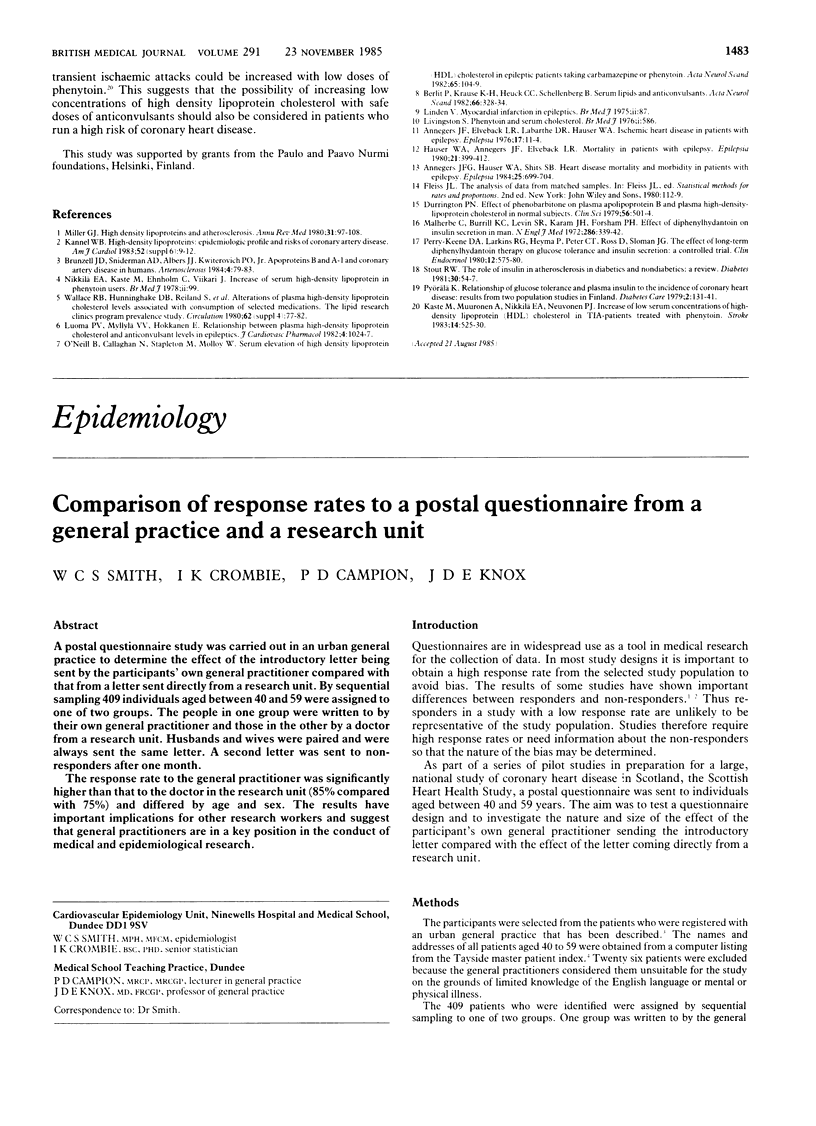Abstract
Patients who use phenytoin and some other anticonvulsive drugs have been shown to have raised concentrations of plasma high density lipoprotein. As this lipoprotein is known to be inversely associated with the incidence of ischaemic heart disease the causes of death of all patients with epilepsy known to be taking anticonvulsive drugs who died during 1978-80 were studied. Of 1399 deaths of anticonvulsant users, 258 (18.4%) were caused by ischaemic heart disease. This was significantly less (p less than 0.001) than the 382 deaths from ischaemic heart disease (27.3%) observed among paired controls matched for sex, age, and date of death. The total cardiovascular mortality was also lower among patients with epilepsy than among controls (p less than 0.02) despite there being more deaths due to cerebrovascular disease among patients. The difference in mortality from ischaemic heart disease was significant for both sexes and was not accounted for by excess deaths due to any other single cause. Users of phenytoin, carbamazepine, and barbiturates (alone or in combination) showed 29% less mortality due to ischaemic heart disease than respective controls (p less than 0.001).
Full text
PDF


Selected References
These references are in PubMed. This may not be the complete list of references from this article.
- Annegers J. F., Elveback L. R., Labarthe D. R., Hauser W. A. Ischemic heart disease in patients with epilepsy. Epilepsia. 1976 Mar;17(1):11–14. doi: 10.1111/j.1528-1157.1976.tb03376.x. [DOI] [PubMed] [Google Scholar]
- Annegers J. F., Hauser W. A., Shirts S. B. Heart disease mortality and morbidity in patients with epilepsy. Epilepsia. 1984 Dec;25(6):699–704. doi: 10.1111/j.1528-1157.1984.tb03480.x. [DOI] [PubMed] [Google Scholar]
- Berlit P., Krause K. H., Heuck C. C., Schellenberg B. Serum lipids and anticonvulsants. Acta Neurol Scand. 1982 Sep;66(3):328–334. doi: 10.1111/j.1600-0404.1982.tb06852.x. [DOI] [PubMed] [Google Scholar]
- Brunzell J. D., Sniderman A. D., Albers J. J., Kwiterovich P. O., Jr Apoproteins B and A-I and coronary artery disease in humans. Arteriosclerosis. 1984 Mar-Apr;4(2):79–83. doi: 10.1161/01.atv.4.2.79. [DOI] [PubMed] [Google Scholar]
- Durrington P. N. Effect of phenobarbitone on plasma apolipoprotein B and plasma high-density-lipoprotein cholesterol in normal subjects. Clin Sci (Lond) 1979 May;56(5):501–504. doi: 10.1042/cs0560501. [DOI] [PubMed] [Google Scholar]
- Hauser W. A., Annegers J. F., Elveback L. R. Mortality in patients with epilepsy. Epilepsia. 1980 Aug;21(4):399–412. doi: 10.1111/j.1528-1157.1980.tb04088.x. [DOI] [PubMed] [Google Scholar]
- Kaste M., Muuronen A., Nikkilä E. A., Neuvonen P. J. Increase of low serum concentrations of high-density lipoprotein (HDL) cholesterol in TIA-patients treated with phenytoin. Stroke. 1983 Jul-Aug;14(4):525–530. doi: 10.1161/01.str.14.4.525. [DOI] [PubMed] [Google Scholar]
- Livingston S. Letter: Phenytoin and serum cholesterol. Br Med J. 1976 Mar 6;1(6009):586–586. doi: 10.1136/bmj.1.6009.586-b. [DOI] [PMC free article] [PubMed] [Google Scholar]
- Luoma P. V., Myllylä V. V., Hokkanen E. Relationship between plasma high-density lipoprotein cholesterol and anticonvulsant levels in epileptics. J Cardiovasc Pharmacol. 1982 Nov-Dec;4(6):1024–1027. doi: 10.1097/00005344-198211000-00023. [DOI] [PubMed] [Google Scholar]
- Malherbe C., Burrill K. C., Levin S. R., Karam J. H., Forsham P. H. Effect of diphenylhydantoin on insulin secretion in man. N Engl J Med. 1972 Feb 17;286(7):339–342. doi: 10.1056/NEJM197202172860702. [DOI] [PubMed] [Google Scholar]
- Miller G. J. High density lipoproteins and atherosclerosis. Annu Rev Med. 1980;31:97–108. doi: 10.1146/annurev.me.31.020180.000525. [DOI] [PubMed] [Google Scholar]
- O'Neill B., Callaghan N., Stapleton M., Molloy W. Serum elevation of high density lipoprotein (HDL) cholesterol in epileptic patients taking carbamazepine or phenytoin. Acta Neurol Scand. 1982 Feb;65(2):104–109. doi: 10.1111/j.1600-0404.1982.tb03067.x. [DOI] [PubMed] [Google Scholar]
- Perry-Keene D. A., Larkins R. G., Heyma P., Peter C. T., Ross D., Sloman J. G. The effect of long-term diphenylhydantoin therapy on glucose tolerance and insulin secretion: a controlled trial. Clin Endocrinol (Oxf) 1980 Jun;12(6):575–580. doi: 10.1111/j.1365-2265.1980.tb01378.x. [DOI] [PubMed] [Google Scholar]
- Pyöräla K. Relationship of glucose tolerance and plasma insulin to the incidence of coronary heart disease: results from two population studies in Finland. Diabetes Care. 1979 Mar-Apr;2(2):131–141. doi: 10.2337/diacare.2.2.131. [DOI] [PubMed] [Google Scholar]


